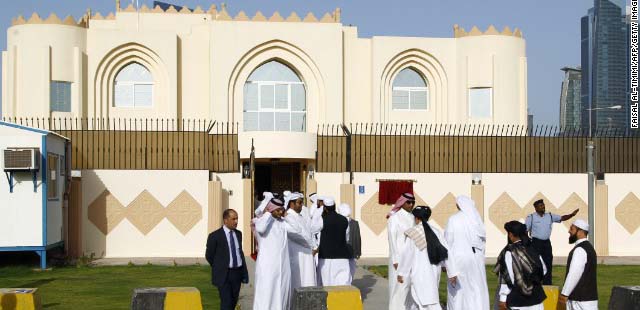Amidst pitch-dark fog hovering over the prospective of peace talks with Taliban militants, the issue of negotiation with armed oppositions has become the obsession of Afghan and foreign officials and also sparked huge discussion in and outside of the country. During his recent visit from Kabul, British Prime minister, David Cameron, emphasized on efforts made for striking a political deal with Taliban militants. His remarks came after a top British General, Nick Carter, talked about the necessity of peace negotiation commencement ten years ago.
In an interview with British Based News agency, the Guardian, the General said: “back in 2002, the Taliban were on the run, I think that at that stage, if we had been very prescient, we might have spotted that a final political solution to what started in 2001. From our perspective, would have involved getting all Afghans to sit at the table and talk about their future”.
It should be noticed by General Nick Carter and his like-minded figures that option of peace talks with opposition has always been on the table. Afghan government from the very start called on militantsto lay down arms and join democratic process without fear of persecution. As result, during past twelve years, some of them willingly or unwillingly welcomed the call and joined the government but the core leadership team has remained in the status of denial perhaps due to the their own reasons.
First of all, if the Taliban leader wanted to remain in power, they would have easily prevented the US-led military intervention by handing over the mastermind behind terrorist attack on New York Twin Towers, the assassinated leader of al-Qaeda network, Osama bin Laden.
Through that the regime could hang on power without any need to, later on, hold political bargain with West-backed government. When they decided to stand against the US-led military force, in spite of being aware of Western military might, there were two possibilities that on either accounts the establishment was not ready to reconcile.
One, it is possible that al-Qaeda elements and the neighboring country’s intelligence had strong presence within the leadership team, banning any anti al-Qaeda efforts. The second possibility is to consider that Taliban were not indeed in pursuit of power instead wanted to enforce Shariah Law. As once a report released by some local media, however I am not certain about its authenticity, claimed that right after the collapse of Taliban in 2001, President Karzai asked their leaders to join democratic process, but they declined on account that they were not interested in power but the Shariah law enforcement.
In addition, I think the Taliban core establishment was dealt so hard that many were not imagining about the possibility of resurgence in the near future, regime leaders fled out of the country or hid inside; its fighters dispersed and its close allies, like Pakistan, joined the global anti-insurgency struggle. Thus, certainly if the global pressure continued on groups main supporters, it was highly unlikely that Mullah Mohammad Omar could lead one of the most successful resurgences of the century.
However, there were other reasons too that somehow provided an opportunity for regrouping of militants such as Iraq war which outshined the anti-insurgency struggle in the country; lack of serious policies towards those countries that seek their interest in destabilization of the country; and finally neglect of intellectual layer of the society by international community who believes in modern and democratic values.
A bulk of US financial support was poured into those people’s pockets who do not actually believe in democracy and democratic establishment, thus I think Western countries invested on wrong guys who perhaps support democracy in proportion to amount of money they receive, not on the necessity of democracy for the country. If part of the international community’s financial support were guided toward young and democratic layers of the society, we would not have had the problem what we have
today. Instead, it is highly possible that we would have had strong democratic institutions, and our foreign allies would not have worried about the consequences of their military withdrawal.
To some extent, the US and its allies are still making similar mistakes, the opening of political office for Taliban by the name of Emarat-e-Islami and hoist of flag without the presence of Afghan officials show their desperateness for reaching a political deal with militants. They should consider that in spite of criticisms of West and Afghan government, the new process have deeply affected on the conservative traditions.
Afghan people will not accept any Taliban-like regime ant any cost. If foreign allies push for a political deal without giving the momentum to Afghan government, in order to bring peace and stability to Afghanistan that will be deliberate mistake. Such efforts will not end up to peace but will spoil the democratic achievements made in expense of thousands of lives and billions of dollars. And after 12 years again figures like General Nick Carter will Regret about why West ever tried to negotiate with militants without supporting the government of President Karzai to leader the process.
Therefore, to prevent such regrets, it is strongly suggested that, first of all, the peace process should be led by Afghan government. Secondly, our allies should ratchet up pressure on Taliban militants that if they want to reach to any peace deal, they have to make it with Kabul because foreign countries have already started their military withdrawal.
Thirdly, diplomatic pressure should be further squeezed on countries that still clandestinely support militants and a strong message should be send to them by our allies that Afghanistan will not be left on its own to pave the way for their interference. These steps can end up to peace to and stability which holds the interest of both Afghanistan and Western countries.

